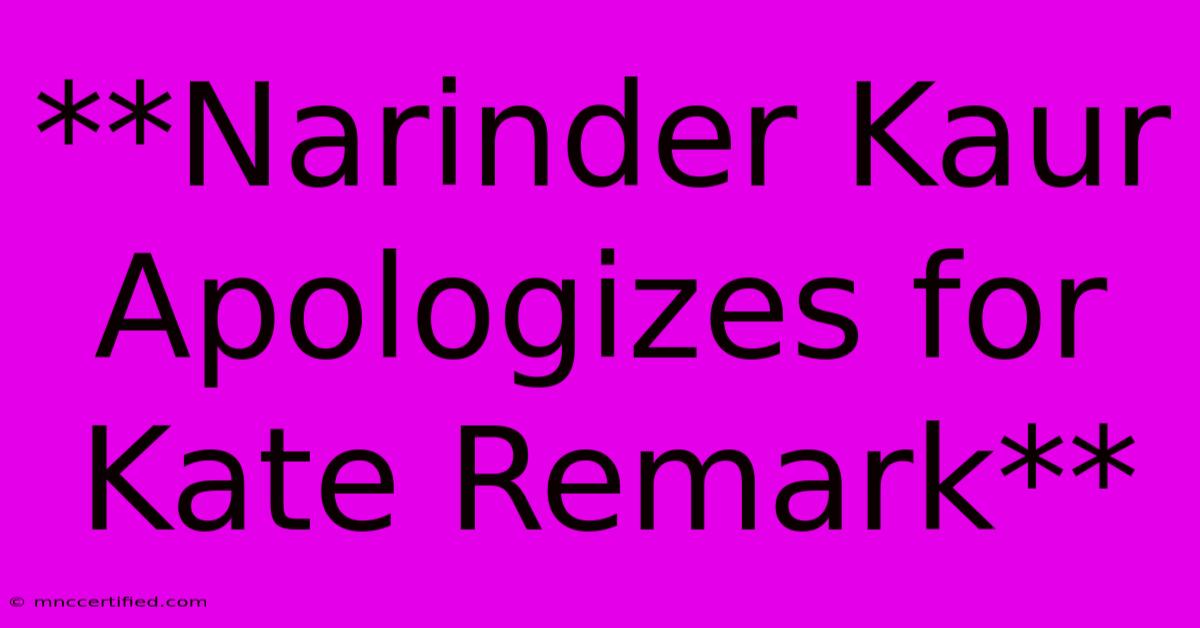**Narinder Kaur Apologizes For Kate Remark**

Table of Contents
Narinder Kaur Apologizes for "Kate" Remark: A Deeper Look at the Controversy
On [Date], Indian politician Narinder Kaur made a controversial comment about [Briefly mention the context of the remark and who "Kate" refers to]. Her statement sparked immediate outrage, igniting a heated debate about [Mention the core issue being discussed].
The Controversy: What Was Said?
Kaur's remarks, made during a [Mention the setting where the remarks were made], drew swift criticism. She reportedly said, "[Quote the controversial statement accurately]."
This statement was widely interpreted as [Explain the interpretation of Kaur's statement and why it was controversial]. Many viewed it as [State the negative implications of the statement] and [State further reasons why the statement was problematic].
Kaur's Apology: A Shift in Tone?
In response to the backlash, Kaur issued an apology, stating, "[Quote Kaur's apology statement accurately]." She further claimed that her words were [Explain Kaur's interpretation of her statement] and [Mention any specific circumstances she cited].
While Kaur's apology attempted to [State the aim of the apology], many argue that [Explain why the apology wasn't enough]. The controversy continues to dominate headlines, with [Mention further reactions or developments regarding the issue].
The Importance of Public Discourse:
This incident highlights the crucial role of public discourse in shaping societal norms. Kaur's remarks, regardless of her intent, demonstrate the potential for [Explain the potential negative consequences of insensitive language].
Moving forward, it's essential for public figures to [State key points about responsible public discourse] and [Highlight the importance of understanding and respecting diverse perspectives].
Key Takeaways:
- Impact of Language: Words have power, and public figures must be mindful of the potential consequences of their statements.
- Importance of Context: While apologies can help mitigate damage, understanding the context and impact of remarks is vital.
- Constructive Dialogue: Open and respectful dialogue is necessary for addressing sensitive issues and fostering a more inclusive society.
This controversy serves as a reminder that [Summarize the key takeaway about the importance of responsible communication]. As we navigate an increasingly diverse and interconnected world, it is crucial to [Conclude with a call to action promoting respectful and understanding communication].

Thank you for visiting our website wich cover about **Narinder Kaur Apologizes For Kate Remark**. We hope the information provided has been useful to you. Feel free to contact us if you have any questions or need further assistance. See you next time and dont miss to bookmark.
Featured Posts
-
Fisher Investments Interview Process
Nov 12, 2024
-
Manchester Hosts Mtv Emas 30th Anniversary
Nov 12, 2024
-
Golden Bond Golden Retriever Rescue
Nov 12, 2024
-
Barry Bonds Pittsburgh Pirates Card
Nov 12, 2024
-
Ncaa Womens Soccer Bay Area Dominance
Nov 12, 2024